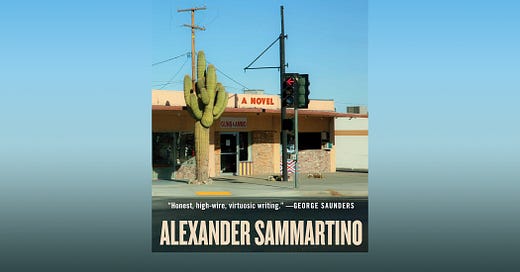An Encore for Italian-American Fiction
Alexander Sammartino’s entertaining yet affecting debut novel, ‘Last Acts,’ carries forward a vaunted literary tradition.
Last Acts
by Alexander Sammartino
Scribner, 224 pp., $27
A LITTLE OVER A CENTURY AGO, on Good Friday 1923, New York City firemen worked frantically to clear the rubble of a tenement that had collapsed, trapping over a dozen laborers in its basement. Father Patrick O’Connor, the fire department’s chaplain, rushed through a street crowded with onlookers to administer the last rites, which he did through the wreckage in case the men were not reached in time. Their screams and groans guided the efforts of the firemen as they wildly swung their shovels and pickaxes.
Amazingly, most of the laborers, though seriously injured, had survived: a miracle arriving just before Easter. Yet several had perished. They were poor Italian immigrants who had been hired to raze the old building for new construction, and their fates had been signed by negligence: Because of the holiday, the city building inspectors assigned to the project were absent. No one had noticed that the building’s south wall was buckling, leading multiple floors to sag and then, calamitously, to collapse.
One of the men who died was Geremio di Donato, a 36-year-old immigrant from Vasto, Italy and the father of seven children. Di Donato’s body, “crushed almost beyond recognition,” was found after two days of excavation. The police waited to inform his wife out of respect for “her condition”—she was pregnant with their eighth child—but her eldest child, Pietro, figured out the truth. His father’s tragic death changed his life. It would also compel his art.
Fourteen years after the tenement collapse, Esquire magazine would publish “Christ in Concrete.” The editors noted that the story marked the literary debut of “an almost incredibly talented young Italian bricklayer lately turned author,” Pietro di Donato. The 25-year-old’s cover letter to the magazine was rather dramatic:
What can I say, other than—I am twenty-five—been a bricklayer since thirteen—support a large family—I am alive—and yet dead—have died a thousand times in the guts of great Job, who has weighted my life and rises everywhere before me—he’s not human—my soul scene is a maelstrom of bricks, mortar, goading foremen, leering suckers, whore-faced bosses, shouts, sweat, madness and mute death on Job.
The editors loved the story and its author’s biography, but they tasked one of the editors to investigate to make sure they weren’t being taken in by a blowhard. The conclusion: di Donato was the real deal. He had a grammar-school education and had taken night courses in engineering. He became a bricklayer when he was 13 to support his family after his father died, and in the intervening years, he had “helped build half the Bronx.” Not only that, the editor reported: di Donato “looks like Dante.” Like his father, he was a laborer, but he also wanted to write.
In 1939, di Donato published the expanded version of Christ in Concrete as a novel. Readers and critics lauded his voice as simultaneously literary and authentic—a nod, perhaps, to the idea that the purest written word evokes the cadences and tones of real speech. The book opens: “March whistled stinging snow against the brick walls and up the gaunt girders. Geremio, the foreman, swung his arms about, and gaffed the men on.”
Early in the novel, Geremio dies as his real-world analogue likely did, following an episode of protracted suffering amid a familiar-sounding construction accident:
With a desperate burst the lung-prisoned air blew an opening through the shredded mouth and whistled back greedily a gasp of fresh air. He tried to breathe, but it was impossible. The heavy concrete was settling immutably and its rich cement-laden grout ran into his pierced face. His lungs would not expand and were crushing in tighter and tighter under the settling concrete.
His last act was to try and live.
IN THE YEARS SINCE ITS PUBLICATION, Christ in Concrete has come to be understood as the prototypical Italian-American novel. It is a perfectly imperfect book, replete with overwrought sentences that were never sanded and polished to suit the tactful minimalist sensibilities of college writing program instructors. In this way, it honors the immigrant culture in which it was rooted; we Italian Americans are a sentimental, melancholy, melodramatic bunch, prone to obtuseness and exaggeration, but also magnificence.
Last Acts, Alexander Sammartino’s debut novel, arrives in the Italian-American storytelling tradition inaugurated by Christ in Concrete. But while di Donato’s novel opens with a father’s death, Sammartino’s novel begins with a son’s resurrection.
David Rizzo, beleaguered owner of a firearms store in Arizona, had waited “all his life” for “a sign from above.” The sign came through his 30-year-old son, Nick, who had overdosed and died but was resuscitated. David visits Nick in the hospital; his son is “pale, sunken, forlorn. He had a lazy beard and the curls in his hair were greased to the right side of his head.” Yet after a coma and three days of detox, he was alive.
David Rizzo is a character straight out of Italian-American central casting. He “owned an accomplished vocabulary of gestures.” (You know just just the ones.) He was “often outraged,” although he was “also often elated.” His outfits “had dulled from years of consistent wear.” A former Green Beret, he “believed a man was the sum of his actions, and he was dismayed by his own total.” Equal parts self-effacing and aggrandizing, he’d tried—and failed—at innumerable business ventures. He sold recyclable IV bags to hospitals; Shasta jacuzzis to hotels. He sold “every type of car, minus the luxurious.” Then there were the “blenders, toasters, wood-fire pizza ovens, never-dulling knives, dishwashers and washing machines and microwaves and refrigerators.”
He had finally come to own Rizzo’s Firearms at the edge of the desert, mountains delimiting a distant horizon. He’d sit behind the store “smoking on a lawn chair,” staring out into “the clean endless sky.” He was about to sell the place when Nick came back from the dead. But now “there was no need to worry because, the last time Rizzo checked, this was still America, and in America there would always be hope.”
America is never more of a project, a dream, than it is to those who arrive from elsewhere. Like converts to a religion, many of them take up their adopted country as both a tradition to be maintained and a project to be shaped.
Nick is like America to David: a creation of his, and therefore a source of guilt. Rather than go to rehab, Nick begins to work for his father—first in a customer-facing role within the store, and then as a marketing and social media whiz. David appreciates the help, but his real desire is to get closer to his estranged son, and he thinks the best way to do that is to probe the nature of Nick’s resurrection. “You died, Nick,” he says. “You must’ve seen something while you were dead. Let’s get that in here.”
Nick parries away the question. “I don’t have anything insightful for you,” he tells his father. No light. No ascendance to the heavens. No calming voice.
David is incredulous. “How could there be no afterlife?” he wonders. “But how could this be it? How could this be all he had? The simple biology that ruled his life was ridiculous, the lack of grace an incredible crime. How could he be anything but terrified?”
An obsession with last acts is not surprising. A Roman Catholic, David ponders ultimate questions through “an unpolished faith.” For years, he pantomimed his way through Mass, offering “sonorous mumbles” in lieu of the sung verses he never bothered to learn. His regular churchgoing ended with his divorce. After that, “no confession, no alms, no sacrament, no doorway handshakes.”
Yet with Nick’s return and their shared commercial mission, David has found a higher purpose. The pair cut a television ad starring Nick that centers on his recovery and emphasizes the store’s commitment to sending some of its proceeds to charitable organizations combating opioid addiction. (“My father, David Rizzo, has made it his mission to be the first gun shop in America that aims for a social good. . . . At Rizzo’s Firearms, we are shooting addiction dead,” Nick says during one of several fraught takes.) It strikes a chord, and sympathetic families flock to the store to buy guns. David becomes a local celebrity. He makes money and spends more. Former friends, feeling a bit betrayed, protest the store.
HALFWAY THROUGH LAST ACTS, the novel feels as if it's spinning in place. But the deliberate, unshowy pace is a successful narrative ruse that leaves the reader relaxed and unsuspecting when the plot arrives at its pivotal moment. There is a school shooting, but there are no deaths. (Journalists dub the event “the Mass Survival.”) Still, David sold the gun that was used by the 17-year-old shooter.
Justice is swift, and David goes to prison, leaving Nick in charge of his father’s store, debts, and failed promises. Nick feels guilty; he wonders if his addiction had frayed his father’s life. Perhaps inevitably, Nick follows his father’s tendency to make bad business deals and alliances, and a litany of unsavory characters make him promises that they don’t intend to keep. “Was he losing his mind?” Nick wondered “Or was the world? This thought alone induced an unbearable degree of agita.”
Nick throws himself into the gun store, successfully building a social media presence and brand that later produces disastrous results. Overwhelmed, and convinced that the store’s salvation is his ultimate charge, he relapses into addiction: “Soon Nick was on his ass, in the garage. His head was back, his mouth open, he felt steady and true. The last thing he remembered that night was the space between the concrete and the garage door.”
In his affectionate survey of the culture and people of his home country, The Italians, Luigi Barzini writes of sistemazione, the “dream of most Italians.” The word does not admit of precise translation but essentially denotes a steady place in the world: “a mediocre but durable position, protected from unforeseen events, with a predictable career, some moral authority, and a pension at the end.” He shares the advice of a dying Roman father to his sons: “My sons, you must all try to have an occupation in life. Life without an occupation is contemptible and meaningless. But always remember this: you must never allow your occupation to degenerate into work.”
This concept provides us with a valuable point of connection between Last Acts and Christ in Concrete. Geremio di Donato was robbed of his sistemazione by the work itself, an especially cruel fate for an Italian immigrant laborer; this catastrophe understandably jaded the view of his son and spurred his art. So Italian-American fiction’s founding story is about a foundational loss. Last Acts continues this legacy by depicting a compromised bid for sistemazione, but while death is near, it has not yet arrived. The book has too much business in the living present to take that final appointment. Even so, both books are ultimately resigned to a nostalgic melancholy; the dreams of the characters ultimately exceed the humble ideal of sistemazione. In true Italian-American fashion, their aspirations are too grand to be realized in this world.
Last Acts energetically satirizes the hyperbolic, degrading rhetoric of consumerism generally and gun culture in particular, and yet, as is the case for all great satires, the story it tells is deeply existential. We eventually come to learn that Nick Rizzo did see something when he died after all, and that he remembered what he saw when he received his life back. Although the last act of the novel offers a gentle reprieve, Nick continues to keep the secrets of the afterlife from his father. We will all learn them, of course—just not yet.






